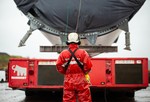09/04/2008
USA - Ocean wind power maps reveal possible wind energy sources
Efforts to harness the energy potential of Earth's ocean winds could soon gain an important new tool: global satellite maps from the National Aeronautics and Space Administration (NASA). Scientists have been creating maps using nearly a decade of data from NASA's QuikSCAT satellite that reveal ocean areas where winds could produce wind energy. The new maps have many potential uses, including planning the location of offshore wind farms to convert wind energy into electric energy.
"Wind energy is environmentally friendly," said study lead author Tim Liu, a senior research scientist and QuikSCAT science team leader at NASA's )et Propulsion Laboratory (JPL) in Pasadena, California. "After the initial energy investment to build and install wind turbines, you don't burn fossil fuels that emit carbon. Like solar power, wind energy is green energy."
QuikSCAT, launched in 1999, tracks the speed, direction and power of winds near the ocean surface. Data from QuikSCAT, collected continuously by a specialized microwave radar instrument named SeaWinds, also are used to predict storms and enhance the accuracy of weather forecasts.
Wind energy has the potential to provide 10 to 15 percent of future world energy requirements, according to Paul Dimotakis, chief technologist at )PL. If ocean areas with high winds were tapped for wind energy, they could potentially generate 500 to 800 watts of energy per square meter, according to Liu's research. Dimotakis notes that while this is slightly less than solar energy (which generates about one kilowatt of energy per square meter), wind power can be converted to electricity more efficiently than solar energy and at a lower cost per watt of electricity produced.
According to Liu, new technology has made floating wind farms in the open ocean possible. A number of wind farms are already in operation worldwide. Ocean wind farms have less environmental impact than onshore wind farms, whose noise tends to disturb sensitive wildlife in their immediate area, researchers said.
"Wind energy is environmentally friendly," said study lead author Tim Liu, a senior research scientist and QuikSCAT science team leader at NASA's )et Propulsion Laboratory (JPL) in Pasadena, California. "After the initial energy investment to build and install wind turbines, you don't burn fossil fuels that emit carbon. Like solar power, wind energy is green energy."
QuikSCAT, launched in 1999, tracks the speed, direction and power of winds near the ocean surface. Data from QuikSCAT, collected continuously by a specialized microwave radar instrument named SeaWinds, also are used to predict storms and enhance the accuracy of weather forecasts.
Wind energy has the potential to provide 10 to 15 percent of future world energy requirements, according to Paul Dimotakis, chief technologist at )PL. If ocean areas with high winds were tapped for wind energy, they could potentially generate 500 to 800 watts of energy per square meter, according to Liu's research. Dimotakis notes that while this is slightly less than solar energy (which generates about one kilowatt of energy per square meter), wind power can be converted to electricity more efficiently than solar energy and at a lower cost per watt of electricity produced.
According to Liu, new technology has made floating wind farms in the open ocean possible. A number of wind farms are already in operation worldwide. Ocean wind farms have less environmental impact than onshore wind farms, whose noise tends to disturb sensitive wildlife in their immediate area, researchers said.
- Source:
- Sea Technology
- Author:
- Edited by Trevor Sievert, Online Editorial Journalist / Author: Sea Technology Staff
- Email:
- ts@windfair.net
- Link:
- www.windfair.net/...
- Keywords:
- wind energy, wind farm, renewable energy, wind power, wind turbine, rotorblade, offshore, onshore


























